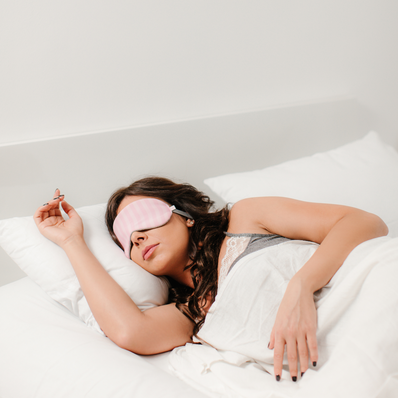|
By Jacqui Mulholland You might be wondering about the benefits of a regular meditation practice on your quality of sleep. What is happening in the brains of meditators and how can you utilise some simple techniques to improve your sleep? It has been shown in scientific research studies that meditation improves the production of melatonin naturally and very significantly. So what is melatonin?
It is a chemical hormone that is produced in the pineal gland that is designed to prepare the body for sleep. Levels usually tend to peak around bedtime, when the natural light dims with the setting of the sun and our biological system prepares for sleep. Melatonin is necessary to strengthen and support the body’s immune system, slow down the ageing process, and is also linked to the prevention of numerous diseases. Unfortunately our increasing dependence on technology and unnatural light source exposure on our many devices and screens have increased, as well as the social and cultural demands to work longer, harder and through the night have upset this delicate natural balance. Our bodies aren’t given adequate opportunity to disengage from the busyness and the overstimulation of your brain to allow your body to prepare for sleep. The light and our addiction to technology hijacks your awareness, bypassing your body’s natural signals that your brain is ready to sleep. There have been studies that have shown that regular meditation can help increase the production of melatonin in your brain, resulting in better sleep quality and even assist in the prevention of many diseases. This is just one of the very good reasons to start introducing a simple regular meditation practice to support the rebalancing of this natural process that is critical to our health and wellbeing. And the good news is, you don’t have to meditate for hours a day and you don’t even need to do it at the same time each day for it to improve your sleep. Even 15 - 20 minutes a day can help increase your melatonin production. The obvious time to try this, would be around bedtime when you could use this time to establish a new habit of disengaging from your devices and switch off the lights and devote some real time to this process of slowing down and encouraging the natural rhythms of your body to kick in. The meditation can be done lying down in bed, and you can get nice and warm and comfortable and allow your body to naturally settle into the space and begin to turn your attention inward, focusing on your senses and the flow of your breath. Focus on relaxing, releasing and sinking your body weight into the bed. This might ease you into a deep & restful sleep. Or you can do this as a practice just before bedtime in a safe cosy space to prepare for sleep. Even if an evening practice sounds like it wouldn’t suit, you could try another time of day, morning, afternoon, early evening, the effects are the same. You are still promoting the regulation of the production of melatonin and offering your body a nurturing space. Regular meditation supports a number of functions in the body and can improve overall health and wellbeing by prioritising your downtime. Helping you practice slowing down and taking time to tune in to your body so that you become more aware and responsive to your needs. Another important part of this process is it helps to reduce the amount of cortisol (stress hormone) active in your system as you initiate the relaxation response. Without this crucial step your body will have a very difficult time recovering from illness & injury including soft tissue and muscle repair. Meditation helps to regulate your internal environment by balancing hormones and allowing your immune system to function more effectively. Sleep is also crucial to this process. Another effective technique to further assist you with your sleep and ability to regulate and engage the relaxation response is massage. Massage has also been shown to improve sleep quality and the beauty of massage is you can combine it with a meditation practice while you are receiving your treatment. If you are having trouble sleeping and want to try a natural and proven technique that you can do yourself at home to support the recovery of your body, give yourself 10 - 15 mins a day of quiet downtime (no screens!). If you would like some assistance with establishing a meditation practice, I can help you out. I am a qualified meditation teacher with over 5 years experience and a meditation coach for the Australian Centre for Meditation & Mindfulness. Ask me about how to become familiar with the concepts of meditation and mindfulness so you can take some simple skills and techniques home and use them in your own time. I work one on one with individuals via zoom, in small groups online and in person to guide you through a full meditation practice, teach you simple techniques to get you started and offer you personalised support as you are establishing your own home practice. There can be several obstacles and challenges to starting a new meditation routine, which is why having the support of a coach or a meditation group is so important and will increase your chances of being able to sustain and support a simple meditation practice that suits your lifestyle. Want to learn more or find out about working directly with me? You can ask me at your next remedial massage appointment, or you can contact the clinic directly by email to [email protected] or calling our team on 03 8204 0970. Guest blog by Kathryn Messenger, Naturopath at Whole Naturopathy. As a naturopath, I have studied both nutrition and herbal medicine for both treating and preventing disease. Naturopathic treatment varies depending on the how individual person experiences the disease, their health history and priorities. I love using herbal medicine as each formula of 4-6 herbs is different, depending on what each person needs. Food has a powerful effect on health, both positively and negatively, and I believe in a diet high in fruit and vegetables, together with protein and healthy fats; but low in highly refined foods (such as sugar and white flour products) and food additives (colours, flavours, and preservatives). The Mediterranean diet follow this basic outline and has been studied for its health benefits. If you find foods that you enjoy, a healthy diet is easily sustainable. Here are some conditions where a naturopathic treatment could work alongside myotherapy. Fibromyalgia Vitamin D is an important nutrient for those that suffer from fibromyalgia, and studies have shown a reduction in pain with supplementation, as well as an improvement to mental health issues such as anxiety and depression. A blood test for Vitamin D gives a reference range of 50-250 nmol/L, with the lower end of this range set in order to prevent osteoporosis (spontaneous spinal fractures). I use the Functional Medicine Ranges for blood tests which are the levels which have been found in optimal health. The optimal range for vitamin D is between 100-150nmol/L. Supplementing is recommended if your levels are below 100nmol/L, especially is the winter. In the summer, try to expose arms or legs to the sun for around 15 minutes a day, depending on your skin type. Try to achieve maximum exposure with no burning or redness afterwards. Stress contributes to a wide range of health issues including fibromyalia, and I love using a group of herbal medicines called ‘adaptogens’. These herbs make you like the ‘energiser bunny’, able to just keep going. In clinical trials on athletes, they could swim or run further or for longer when taking adaptogens. They help you adapt to stress, and therefore cope better with life stressors. Lifestyle changes to reduce stress are really important, and but are even more effective when combined with these herbs. Osteoarthritis Inflammation is a big part of any arthritis, and chronic inflammation contributes to many diseases characterised by pain. Omega 3 fatty acids have been shown to reduce inflammation, the best source of these is oily fish such as salmon or mackerel, but they are also found in nuts and seeds. In order to meet the daily requirements of omega 3, it is the recommendation is to eat fish twice a week, otherwise a fish oil supplement may be of benefit. Ginger is an anti-inflammatory herb and is particularly useful in those with poor circulation. This is seen if you have cold hands or feet, as ginger will increase the blood flow not only to warm you, but to bring oxygen and nutrients to the site of the arthritis. Turmeric is another anti-inflammatory herb and has been well researched for joint pain. You could try to increase it in your diet, although a supplement may be required for adequate intake. As well as increasing anti-inflammatory foods, it’s important to reduce pro-inflammatory foods. Refined sugar is the main culprit here, which increases inflammation and should be avoided. Whilst fruit which contains natural sugars, it is also high in fibre and antioxidants which has a positive effect on health. Sugar is devoid of other nutrients required to sustain and repair. In osteoarthritis, often the collagen of the joint is deteriorated. Vitamin C is important in the formation of collagen, and bone broth or a collagen powder can help to support the joint. Protein is such an important nutrient. It is required for growth and repair of all tissues, particularly muscles. Every meal should include a source of protein: meat, fish, eggs, dairy, nuts, seeds, beans, or legumes. So much can be done to improve your health naturally. If you’re unsure if a naturopath can help with your condition, please contact me to discuss you unique health issues. 0493 294 159
Suite 1, 24/1880 Ferntree Gully Rd Mountain Gate Shopping Centre Ferntree Gully, Victoria (Inside Providence Foods) [email protected] www.wholenaturopathy.com.au |
Meet Our Team
We have a team of great practitioners available 7 days a week at our Rowville clinic. Archives
July 2024
Categories
All
|
Got a question about Myotherapy?
Contact Mel by phone, email or Facebook
|
Simple Wellness Myotherapy & Remedial Massage Clinic
Shop 12B 150 Kelletts Rd Rowville VIC 3178 |
Phone us on
03 8204 0970 |




 RSS Feed
RSS Feed